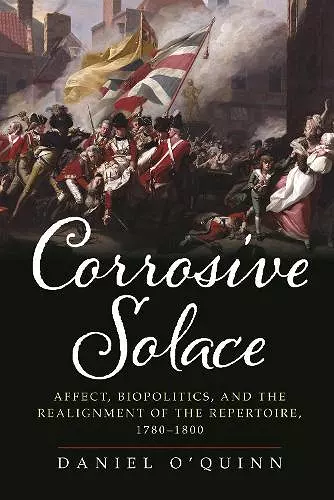Corrosive Solace
Affect, Biopolitics, and the Realignment of the Repertoire, 1780-1800
Format:Hardback
Publisher:University of Pennsylvania Press
Published:11th Oct '22
Should be back in stock very soon

In Corrosive Solace, Daniel O'Quinn argues that the loss of the American colonies instantiated a complex reorganization in sociability and politics in the British metropole that has had long-lasting effects on British national and imperial culture, which can be seen and analyzed within its performative repertoire. He examines how the analysis of feeling or affect can be deployed to address the inchoate causal relation between historical events and their mediation. In this sense, Corrosive Solace's goals are twofold: first, to outline the methodologies necessary for dealing with the affective recognition of historical crisis; and second, to make the historically familiar strange again, and thus make visible key avenues for discussion that have remained dormant. Both of these objectives turn on recognition: How do we theorize the implicit affective recognition of crisis in a distant historical moment? And how do we recognize what we, in our present moment, cannot discern?
Corrosive Solace addresses this complex cultural reorientation by attending less to "new" cultural products than to the theoretical and historical problems posed by looking at the transformation of "old" plays and modes of performance. These "old" plays—Shakespeare, post-Restoration comedy and she-tragedy—were a vital plank of the cultural patrimony, so much of O'Quinn's analysis lies in how tradition was recovered and redirected to meet urgent social and political needs. Across the arc of Corrosive Solace, he tracks how the loss of the American War forced Britons to refashion the repertoire of cultural signs and social dispositions that had subtended its first empire in the Atlantic world in a way more suited to its emergent empire in South Asia.
"Read the title carefully and then take a deep breath. For this book offers a phenomenal look at how a collective, embodied, ephemeral phenomenon like theatre evokes affective experiences that distill and register not simply nascent public feeling but also changes in the stylization and mobilization of feelings that both make and mark epochal shifts in cultural history. It is challenging enough to say what any mind-body is feeling. Describing what an unruly body of late eighteenth-century theatre-goers was sensing and specifying how their disparate reactions informed habits of identity and components of Britain's cultural patrimony is the accomplishment of Corrosive Solace." (Eighteenth-Century Fiction) "
The significance of O'Quinn's argument is its ability to link the everyday and the personal with the social, the political, and the cultural. At the level of both form and content, O'Quinn attempts to understand the implications
and potentialities of affective recognitions, aesthetic mediations, formal transformations, and generic innovations in all their urgency and topicality, as a response to a cultural need to adapt to a period of turbulent transition instigated by historical crises. The argument progresses from issues of embodiment to questions of consciousness to transformations in processes of socialization to explain the emergence of systemic norms. It effectively reconciles phenomenological investigations with structuralist manifestations, offering a forensic cultural analysis of affect and affective sociability.
ISBN: 9781512823110
Dimensions: unknown
Weight: unknown
376 pages